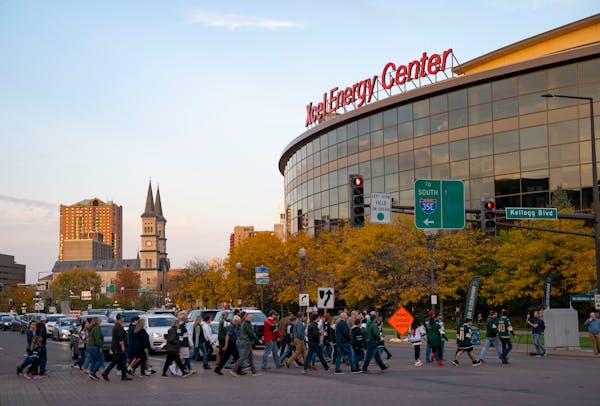The Minnesota Wild was at home for a game with Nashville on March 3, 2020, and the Tuesday night crowd was announced at 17,242, a few hundred under capacity.
Zach Parise scored his 24th goal, Ryan Suter had an assist and the Wild won 3-1, putting its record at 33-26-7 and one point removed from eighth place in the Western Conference.
Five hundred and 95 days later, on another Tuesday night, the Wild was back in Xcel Energy Center for its next official home game. There had been three exhibitions, putting an actual 10,000-12,000 in the building, making this the first occasion for Wild loyalists to show up in full force since the North American invasion of the worldwide pandemic.
Return they did, with what was announced as an over-capacity 18,156. The theme of the night became resilience:
The Wild gave up an empty-netter with 74 seconds left to fall behind 6-4, won an offside challenge to nullify that goal, and quickly tied it 5-5 on Joel Eriksson Ek's swat of a puck out of the air.
The Wild then won it 6-5 on a 4-on-3 power play in overtime, with Eriksson Ek getting his third goal of the night.
There were examples of resilience all night, starting with what was taking place with the bars and restaurants on West Seventh.
Ten days earlier, Marquisha Wiley, a most innocent bystander, was murdered and a dozen others were wounded during a shootout between two men at the Truck Park Bar.
The businesses along West Seventh lamented the tragedy and also had no choice but to wonder if the street's lifeblood — Wild crowds — would show up in the usual numbers.
I've seen larger turnouts a couple of hours before puck drop, but the jersey-wearing crowd almost filled Tom Reid's Hockey Pub, and Patrick McGovern's, and the Downtowner had most of its tables occupied for dinner … and on it went.
There's great hope for this Wild season, and buoyed by a continuation of Tuesday's significant police presence, perhaps hockey night on West Seventh can return to its pre-pandemic, pre-violence form.
Beyond the comeback, there were a couple of more resilient cases inside the arena that I find amazing. One is Dean Evason finding success as the fifth Wild coach in the 12 years since Jacques Lemaire left as the unforgettable original.
Evason was brought in as an assistant coach in June 2018. It was a decision made fully by General Manager Paul Fenton, not coach Bruce Boudreau.
Fenton lasted 11 months and was derided by many — including owner Craig Leipold — on the way out. Bill Guerin came in as general manager. He fired Boudreau in February 2020 and replaced him with Evason.
The "interim'' tag seemed predictive of Evason's status. He was brought in by a disowned general manager. The pandemic shutdown put the Wild in a preliminary round inside the 24-team playoff bubble. Evason's club went out 3-1 in a series with mediocre Vancouver.
The uncertainty of the pandemic-delayed 2020-21 season probably saved him as coach. Whatever it was, Kirill Kaprizov finally showed up from Russia, the Wild had its first-ever true super talent, and Evason turned out to be a veteran hockey man who believed in coaching a fast pace.
The Wild finished 35-16-5 with 75 points and lost in seven games to Vegas in a terrific playoff series. It also had the third-most points of the 15 teams (excluding expansion Seattle) now in the Western Conference.
Good reason to be optimistic — even after Guerin's decision to drop both Suter and Parise. There will be some cap woes down the road, but with key players Kaprizov and Eriksson Ek already signed to bargain deals by Guerin, the extra-blunt 50-year-old seems capable of escaping.
And then there's Victor Rask. Could anyone have imagined in the winter of 2019 that Suter and Parise would be gone and Rask still would be taking regular shifts?
Fenton decided to break up the youngish nucleus that never fulfilled the promise. His trades included taking Carolina center Rask for the gifted, inconsistent Nino Niederreiter.
It took about three shifts for fans and media to get on Rask. He was not much of a skater and not a true playmaker.
Rask stuck around as a center the past two seasons, with modest offensive numbers. Now, through three straight wins, he's been on left wing with center Frederick Gaudreau and scorer Kevin Fiala.
"Wing is a little different," Rask said Tuesday. "I've always played center. Since youth hockey in Sweden."
How about the criticism he has taken in Minnesota from fans and media from almost Day One?
"I wouldn't know," he said. "I don't look for anything like that. It's very good to be on this talented team."
Enough talent to escape with a win, and send thousands of people streaming down West Seventh, chanting "Let's go Wild.''
Reusse: Basketball coach puts his memories, his yarns, his time in the game into words

Reusse: High praise for Vikings leaders O'Connell, Adofo-Mensah

Reusse: Chicago sports hits an all-time low with lousy teams, including self-destructing Bears

Reusse: Bethel was a surprise to even reach the DIII quarterfinals, but ending still stings


